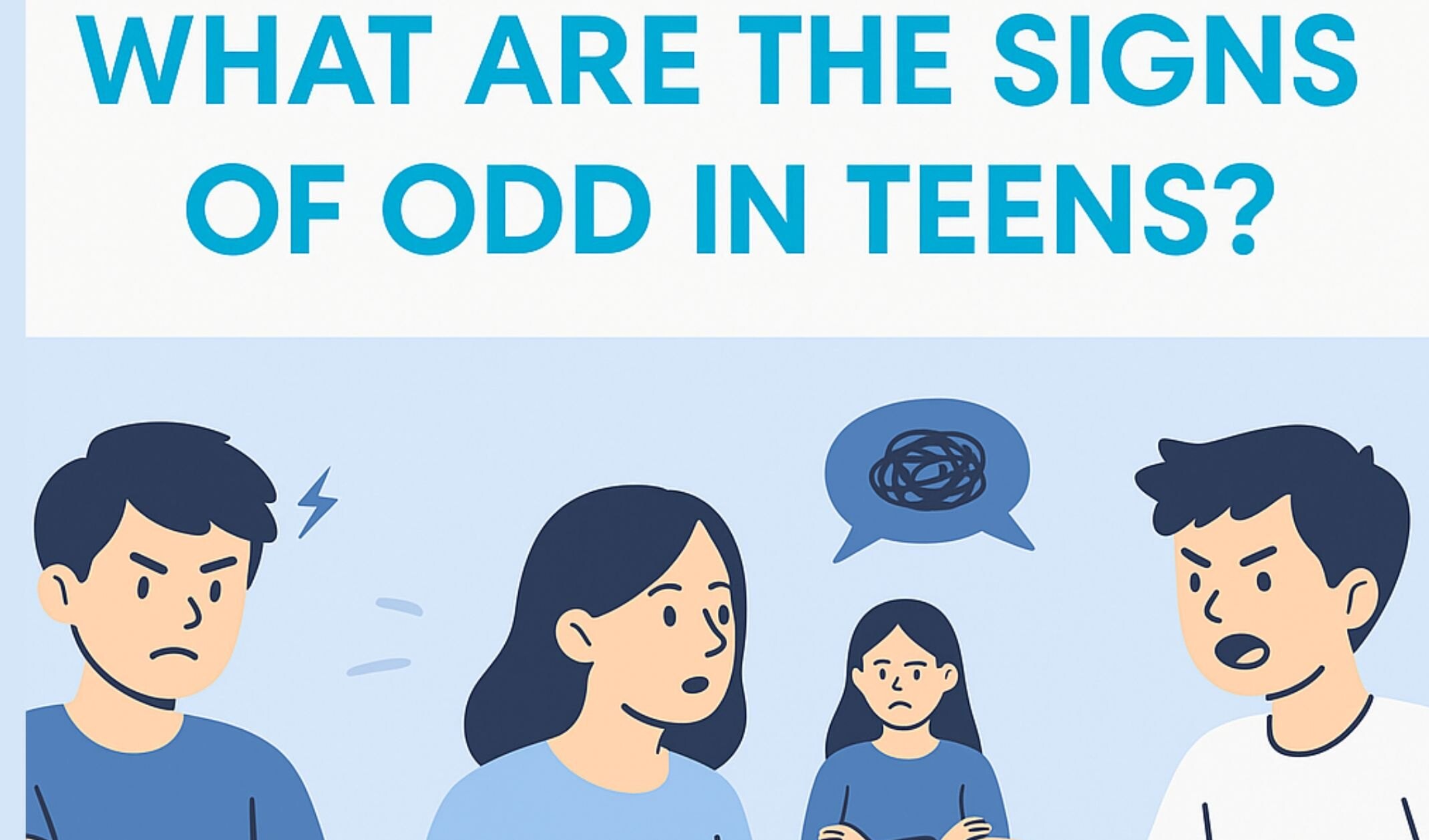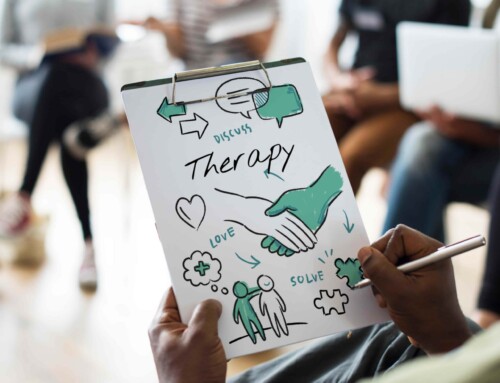Is It Just Rebellion Or ODD In Teens? Key Warning Signs
TL;DR
|
|---|
Raising a teenager can feel like an emotional rollercoaster. But when defiance, arguments, and irritability become a daily battle, it’s natural to wonder if something more serious is going on.
According to the National Library of Medicine, early identification of children and adolescents with moderate to high ODD symptoms, along with interventions that address both defiance and irritability, can lead to better long-term outcomes.
At Total Life Counseling, we meet many families who are in this place of uncertainty. They are unsure if their teen is simply going through a difficult phase or if professional support is needed. We walk alongside parents during this process, offering reassurance, clarity, and guidance toward healthier coping strategies.
In this blog, we’ll explore the signs of ODD in teens, how to tell the difference between normal challenges and something more, and why early support can make a meaningful difference for both teens and families.
What Is Oppositional Defiant Disorder (ODD) In Teens?
Oppositional Defiant Disorder (ODD) is more than just “teen rebellion.” It is a recognized behavioral condition where defiance, resistance, and hostility toward authority figures become a persistent pattern. Unlike typical mood swings, ODD does not come and go. It disrupts a teen’s daily life at home, at school, and in relationships.
What makes ODD unique is the frequency and intensity of conflict. These are not one-off arguments but ongoing struggles that strain families, overwhelm teachers, and isolate teens from peers.
The ripple effect of ODD can be wide:
- At home: constant battles that wear down family dynamics
- At school: missed learning opportunities and clashes with teachers
- With peers: difficulty maintaining friendships due to conflict and resentment
While ODD can be exhausting for everyone involved, it is not a hopeless situation. With early recognition, consistent structure, and professional support, many teens develop healthier coping strategies, rebuild trust, and learn to manage their emotions in constructive ways.
If your teen’s defiance feels overwhelming, you don’t have to face it alone. Book an online counseling session today
What Really Causes ODD In Teens?
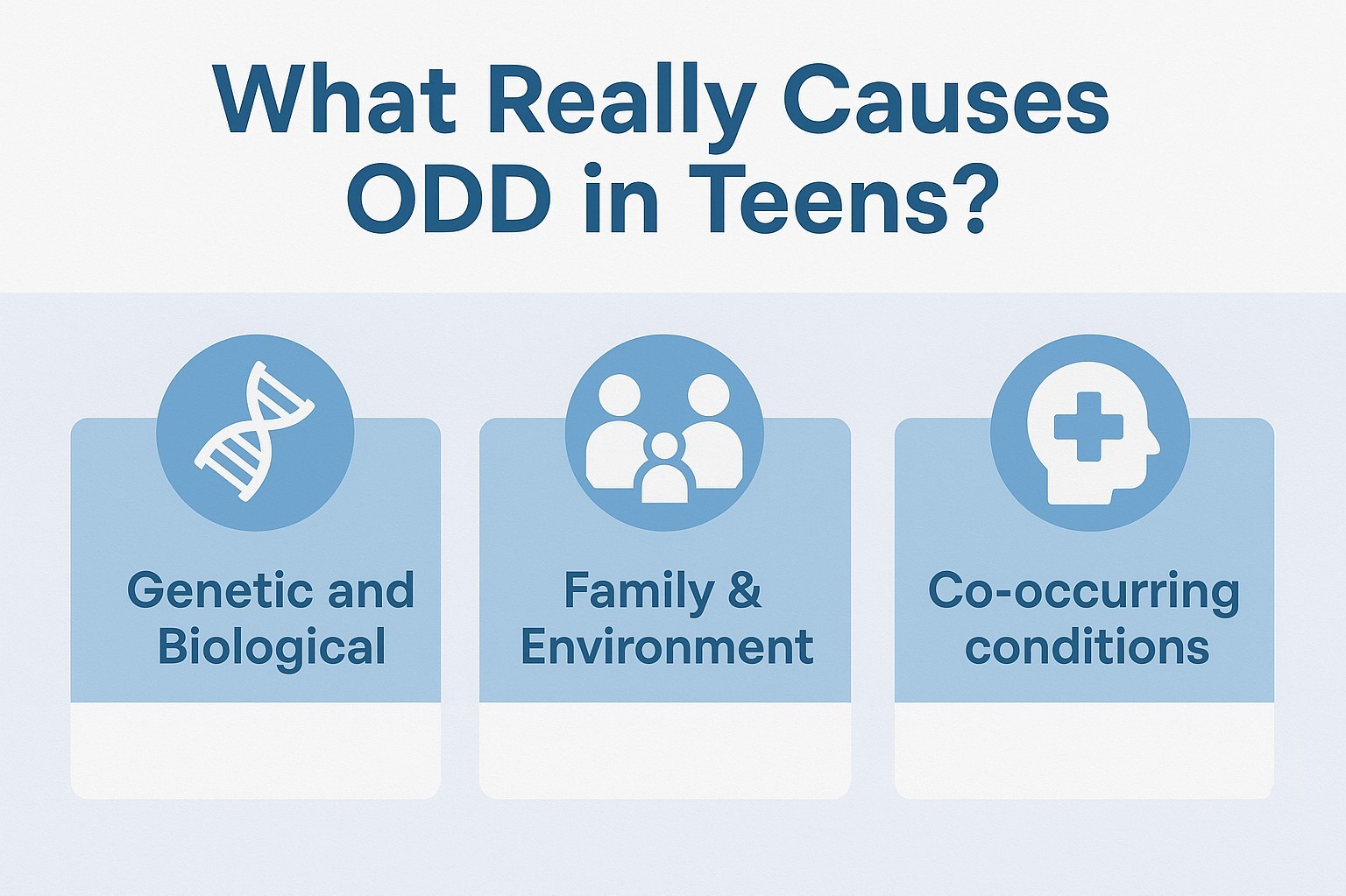
There isn’t one single cause of oppositional defiant disorder (ODD); rather, it develops from a combination of influences including biology, genetic factors, environment, and family dynamics.
Understanding these influences can help parents see that ODD is not about “bad behavior” or “bad parenting,” but a complex condition that needs care and support.
To better understand the development of ODD, let’s take a closer look at the key factors that may contribute to its development.
1. Is ODD Genetic?
Genes can influence whether a teen develops oppositional defiant disorder, but they are only part of the story. According to research by the National Library of Medicine, genetics accounts for about 5% to 17% of ODD symptoms in teens, which means environment and life experiences play a much larger role.
Teens with ODD are also more likely to have relatives with anxiety, depression, or personality disorders, showing that vulnerability can run in families.
Biology matters too. Differences in brain areas that control emotions and self-control, along with imbalances in brain chemicals (neurotransmitters), can make it harder for teens to manage anger, frustration, and impulses.
ODD often occurs alongside other conditions such as ADHD, learning difficulties, or depression. These overlaps can make the symptoms of ODD more complicated and reinforce how closely emotional, behavioral, and developmental challenges are connected. 66% of ODD cases are undiagnosed or unsuccessfully treated ADHD. Once the ADHD is treated often a lot of the ODD behaviors can improve with professional help.
2. Can Family Life Trigger ODD?
A teen’s environment can greatly shape whether ODD traits develop or become more severe. Homes with constant conflict, inconsistent discipline, or limited supervision can make it harder for children to build self-control and respect for authority.
Family stressors add to the risk factors. Neglect, abuse, parental substance use, or untreated mental health struggles can create instability that fuels defiant behavior. Without positive support from family members or consistent routines, these patterns may worsen.
Other environmental factors that may increase the risk of ODD include:
- Frequent moves or school changes
- Ongoing financial stress
- Exposure to community violence
- Peer rejection or association with deviant peer groups
3. Why Does ODD Overlap With Other Issues?
Most parents ask, “Can Oppositional Defiant Disorder coexist with other mental health conditions in teens?” The answer is yes.
Most teens with ODD also struggle with at least one other mental health condition. These co-occurring mood disorders can make symptoms of oppositional defiant disorder harder to manage and treatment more complex.
- Anxiety and depression often overlap with ODD, where irritable mood or defiance may be a way of coping with deeper worries or sadness.
- ADHD commonly co-exists, making impulse control and emotional regulation even more difficult.
If left untreated, ODD can also raise the risk of personality or anxiety disorders later in life. This overlap makes treatment for ODD in teens more complex but also highlights the need for comprehensive support.
That is why early recognition and comprehensive support matter so much. Addressing ODD alongside any other challenges gives teens the best chance to manage emotions in healthier ways and build stronger relationships.
What Does ODD Look Like In Teenagers?
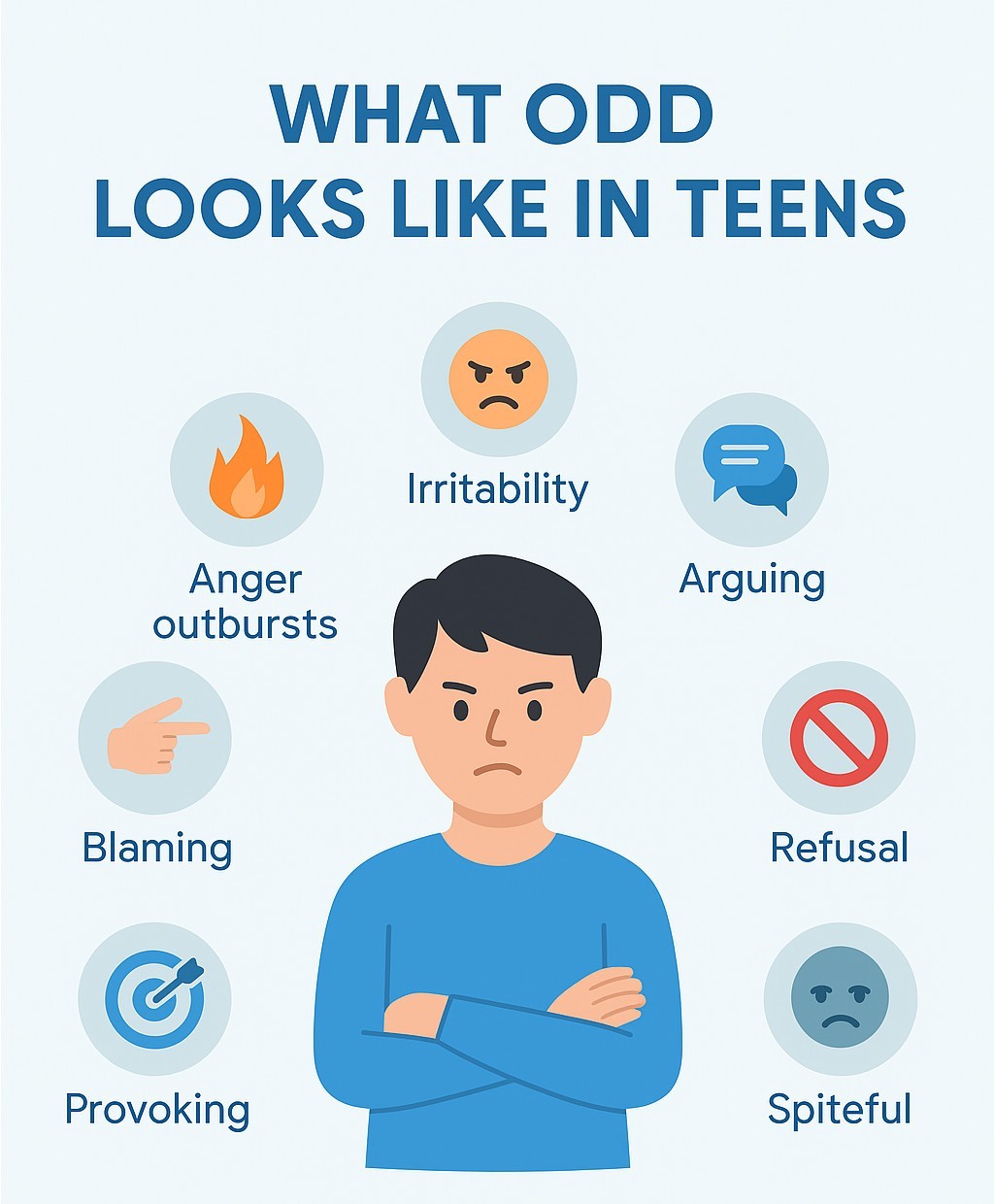
It’s normal for teenagers to push back against rules or argue with parents from time to time. But when defiance becomes a daily struggle that lasts for months, it could point to oppositional defiant disorder (ODD).
Unlike typical teenage mood swings, ODD involves a persistent pattern of negative, defiant, and sometimes hostile behavior that affects home life, school performance, and relationships with peers.
Key signs to watch for:
- Frequent anger or temper outbursts – reacting strongly to even minor frustrations
- Irritability and resentment – appearing easily annoyed, touchy, or holding grudges
- Chronic arguing – regularly challenging parents, teachers, or other authority figures
- Refusal to follow rules – deliberately ignoring or breaking instructions
- Blaming others – rarely accepting responsibility for mistakes or misbehavior
- Provoking behavior – doing things on purpose to upset or irritate others
- Spiteful or vindictive actions – seeking revenge or being intentionally mean, especially if it happens more than once in six months
ODD in teen boys may appear as open defiance and aggression, while ODD in teen girls often shows up in subtler social ways, such as passive resistance, sarcasm, or odd social behaviors in teen girls like relational aggression or manipulation.
Parenting or teaching a child with ODD can feel overwhelming. Join our masterclass and get the guidance, structure, and hope you’ve been looking for.
What Makes ODD Different From Normal Teen Behavior?
While many teens push boundaries and test limits, Oppositional Defiant Disorder (ODD) goes beyond typical adolescent behavior. Here’s how the two differ:
| Normal Teen Behavior | ODD (Oppositional Defiant Disorder) |
|---|---|
| Occasional arguing or testing limits | Frequent, persistent arguments with adults/authority figures |
| Mood swings that pass quickly | Intense anger and irritability that last and resurface often |
| Forgetfulness or mild resistance to rules | Deliberate refusal to follow rules and instructions |
| Some rebelliousness during independence-seeking | Pattern of spiteful, vindictive, or defiant behavior lasting 6+ months |
| Usually maintains friendships and school performance | Strained relationships and academic/social difficulties |
The difference is in frequency, intensity, and impact. Most teens test boundaries occasionally, but ODD behaviors are ongoing and disruptive.
The long-term consequences for an ODD teenager may include academic struggles, damaged relationships, and an increased risk of developing conduct disorder if left untreated.
Recognizing these patterns early is essential. The sooner parents and caregivers identify ODD signs, the sooner a teen can learn healthier coping strategies and families can regain a sense of balance.
How Is ODD Diagnosed In Teens?
Diagnosing oppositional defiant disorder (ODD) in teens takes more than noticing a few arguments or mood swings.
Mental health professionals look for a clear pattern of behaviors such as frequent anger, defiance, and rule breaking that last for at least six months and cause real difficulties at home, school, or in friendships.
This consistency and impact are what guide an official diagnosis.
Here’s what you can expect during the evaluation:
- Detailed history – A counselor or psychologist gathers information about the teen’s behavior at home, school, and with peers.
- Input from multiple sources – Parents, teachers, and sometimes the teen themselves share observations to get a full picture.
- Symptom checklist – Clinicians use tools based on the DSM-5 (Diagnostic and Statistical Manual of Mental Disorders) to see if behaviors like frequent anger problems, arguing, or spitefulness meet the criteria for ODD.
- Screening for co-occurring conditions – Since ODD often overlaps with ADHD, anxiety, or depression, a thorough evaluation also checks for these.
So why does a professional assessment matter? It’s easy to dismiss defiance as “just a phase,” but when behaviors become extreme and disruptive, a professional diagnosis ensures families get the right support.
Also, early identification also lowers the risk of ODD developing into more serious issues, such as conduct disorder.
Connect with our experienced counsellors to get guidance tailored to your child’s needs.
What Are The Best Ways To Treat ODD In Teens?
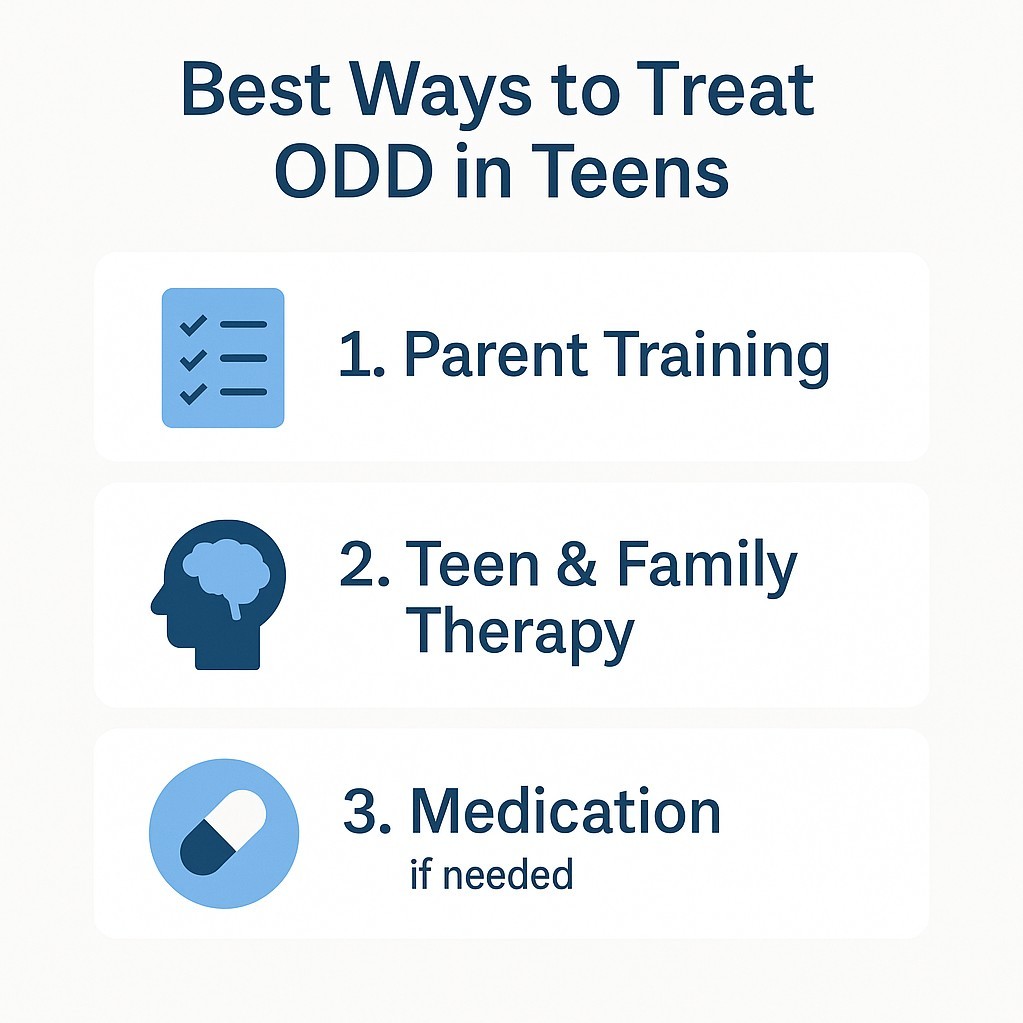
Oppositional defiant disorder is best managed with a plan that supports both the teen and their family. Treatment focuses on reducing disruptive behaviors, improving communication, and teaching healthier ways to manage emotions.
Let’s look at the key strategies that make up an effective treatment plan for ODD.
1. Helping Parents Take The Lead
Parents play a central role in managing ODD. Training programs give caregivers practical tools to guide their teen’s behavior in more positive directions. Instead of daily battles, the focus shifts to consistency, structure, and encouragement. Through these programs, parents learn to:
- Set clear, predictable expectations
- Reinforce cooperation with praise and rewards
- Apply calm and consistent consequences for defiance
- Reduce power struggles by using structured routines
Some of the most effective evidence-based programs include:
- Parent-Child Interaction Therapy (PCIT): Live coaching helps parents strengthen bonds with their child while learning discipline strategies.
- Parent Management Training (PMT): Teaches parents to use positive reinforcement and consistent consequences to reduce defiant behavior.
- The Incredible Years: A group-based program offering strategies for discipline and problem-solving, with added modules for young children and teachers.
- Positive Parenting Program (Triple P): A flexible system that equips parents with assessment tools to manage misbehavior and reduce stress at home.
2. Teen & Family-Focused Therapies
Therapy provides teens with healthier coping skills and helps families improve their relationships. Common approaches include:
- Cognitive Behavioral Therapy (CBT): A type of therapy that teaches teens to recognize unhelpful thoughts, manage anger, and solve problems more effectively.
- Family Therapy: Strengthens communication, reduces conflict, and helps families work together as a team.
- Additional Supports: Programs like anger management and social skills training give teens practical strategies for handling frustration and building better social interactions.
3. Medication(If Needed)
There is no medication made specifically for ODD, but it may be recommended when other conditions are present. For example:
- ADHD: At Total Life Counseling we suggest discussing a list of vitamins specifically before trying medication to help with ADHD. Alos, stimulants can help with focus and impulse control, which may reduce oppositional behavior.
- Anxiety or Depression: Antidepressants may help stabilize mood and reduce irritability and vitamins for Anxiety or Depression can help too!
Medication is not a standalone treatment. It is most effective when combined with therapy and family-based support.
Struggling with the impact of trauma? Explore Trauma-Focused CBT and help your teen find healing, strength, and hope for the future.
Can Teens Outgrow Oppositional Defiant Disorder?
Many parents wonder if their teen will simply “grow out of” oppositional defiant disorder. While some children with mild symptoms may improve as they mature, ODD rarely disappears on its own. In most cases, the disruptive patterns of child’s behavior need structured support and intervention to change.
According to American Academy of Child and Adolescent Psychiatry, about 67% of children diagnosed with ODD no longer meet the criteria within three years. However, this also means a large number continue to struggle well into their teen years if the condition goes untreated.
For roughly 30% of children, ODD progresses into conduct disorder, a more serious condition marked by aggressive and risky behaviors. Conduct disorder usually means that the teen has engaged in a crime and the school resource officer or police get involved.
The takeaway is clear: relying on time alone is risky. Without professional guidance, oppositional behaviors often intensify and put a strain on family life, academics, and peer relationships.
Early treatment gives teens the tools to manage emotions and defiance more constructively, while helping families prevent long-term consequences.
How Does Total Life Counseling Help Teens With ODD?
At Total Life Counseling, we know how challenging it can be when defiance and conflict start to take over daily life. Our licensed therapists specialize in working with children, teens, and families, offering evidence-based care that builds healthier coping skills and restores balance at home.
We provide a wide range of services, including:
- Teen and Child Counseling to manage emotions and reduce disruptive behavior
- Family Therapy to strengthen communication and conflict resolution
- Parent Coaching to give caregivers practical strategies that prevent power struggles
- School Collaboration to create consistency between home and classroom support
- Specialized Programs for ADHD, anxiety, depression, trauma, autism, and social skills training, which often overlap with ODD
By combining therapies like CBT, family therapy, and parent training programs, we help teens learn to handle frustration more constructively while giving families the tools to thrive together.
Take the first step, Book a session with us.
Moving Forward With Hope
Living with ODD can feel overwhelming, but it does not define your teen’s future or your family’s story. With the right support, patience, and professional guidance, real change is possible.
What matters most is taking that first step by reaching out for help and committing to a healthier way forward. Every small effort to build consistency, connection, and understanding lays the foundation for growth.
If you are navigating these challenges right now, remember that you are not alone. Support is available, and with the right tools, your teen can learn to thrive while your family regains peace and balance.
Frequently Asked Questions
Can ODD in teens be managed without professional help?
Managing oppositional defiant disorder without a mental health provider is not recommended. The persistent behavioral problems require structured early intervention. Professional guidance is essential to provide the teen and family with effective strategies to manage symptoms and prevent them from worsening over time.
Are there long-term effects of oppositional defiant disorder if left untreated?
Yes, untreated oppositional defiant disorder has a poor prognosis and can lead to serious long-term effects. These include damaged social relationships, academic failure, substance abuse, and the development of more severe problem behaviors and other mental health disorders like conduct disorder.
Is ODD different in teens compared to younger children?
In younger children, ODD often shows up as tantrums, frequent arguing, and rule refusal. In teens, the behavior becomes more intense, persistent, and socially disruptive, often involving defiance toward teachers, conflicts with peers, and risk of academic or legal problems.
How do you treat ODD in pre teens?
ODD in pre-teens is best treated with early intervention that combines parent training programs, family therapy, and behavioral support at school. Teaching consistent routines, positive reinforcement, and coping skills helps children manage defiance before it intensifies in the teen years.
Can oppositional defiant disorder in teens be managed without professional help?
Some parents try to manage ODD at home with boundaries, discipline, and open communication, but severe symptoms are often difficult to handle alone. Professional guidance can provide the strategies and support needed to improve a teen’s well-being.
What are some natural remedies for ODD in teens?
Natural remedies for ODD in teens focus on lifestyle support, such as regular exercise, balanced nutrition, consistent sleep, mindfulness practices, and reduced screen time. While these can ease irritability and improve self-control, they work best alongside professional therapy and family-based support.
How is Oppositional Defiant Disorder diagnosed in adolescents?
Oppositional Defiant Disorder is diagnosed in adolescents through a clinical evaluation that reviews behavior patterns lasting at least six months. Mental health professionals gather input from parents, teachers, and the teen, use DSM-5 criteria, and screen for co-occurring conditions like ADHD, anxiety, or depression.
Struggling with ADHD, ASD, or Oppositional Defiance Disorder ODD?
It’s Time to Stress Less!
Everyone knows someone struggling with ADHD, ASD or Defiance. So, Jim West Developed the StressLess Educational Series as a comprehensive video program to help people all over the world! StressLess Now or Book Jim as a Guest Speaker Today! Click for more info and free video tips.
Filed in: ADHD, Blog, Boca Raton, Brandon Feinberg, Children, David Duany, Defiance Teens Slider, Family, Jim West, Odd in kids, Oppositional Defiance Disorder, Orlando, Parenting, Stressless, Teens, Tessa McKee
Share This Story, Choose Your Platform!
Total Life Counseling Center consists of Licensed Counselors, masters level therapists, Español counselors, Licensed Mental Health Counselors, business coaches, and image enhancement coaches who provide counseling for emotional, mental, physical and spiritual care including marriage, individual, family, substance abuse and more. TLC’s family, trauma and marriage experts have been interviewed on National and Local TV/Radio over 200 times for their expert advice on Fox News, OWN, WETV, ABC’s Medical Minute and more. Our skilled counselors are relational, approachable and specialists providing therapy services in the Central Florida area including: Orlando, Winter Park, MetroWest, Windermere, Dr. Phillips, East Orlando, Lake Mary, and Clermont, Boca Raton Florida, and Dallas, TX.

